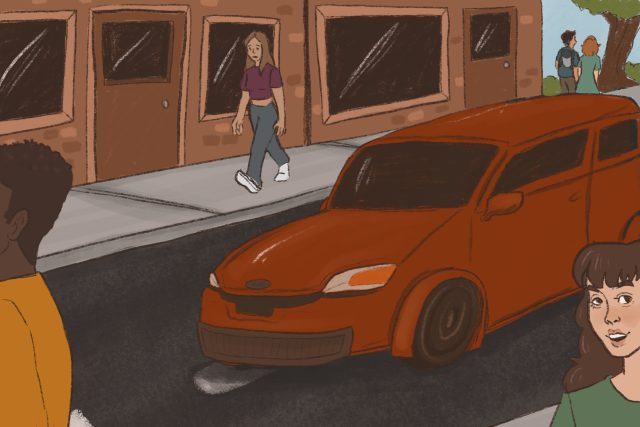[ad_1]
It is, to a certain extent, true that the amount one can do at the University of Michigan depends on their ability to move freely around Ann Arbor. The easier you can travel between classes, extracurriculars, jobs, events, stores and parties, the more you can experience in your limited time here. This makes whether or not you have a car one of the most significant social dividers on campus, comparable to your class or hometown. In short, students who have a car on campus have a genuine advantage over their peers — one that should be recognized and addressed.
In my three-person Kerrytown apartment, one of us has a car. If my other roommate or I want to visit our friends near Burns Park, we can either walk the 20 minutes it takes to get there, hop on a bus, pay for an Uber, ask our other roommate for a ride or just not make the journey at all. Our roommate who has a car can simply drive down to visit our friends and drive home just as easily.
The biggest imbalance regarding cars on campus has to do with autonomy. Having a car allows for more independence: Less time traveling means more time actually doing the activities you’re traveling for. In an interview with The Michigan Daily, Engineering junior Matthew Conley cites this improved autonomy as the most important improvement in his life since bringing a car to campus.
“In the month I’ve had my car here it has substantially affected my college experience, especially being an engineer who lives on Central Campus,” Conley said. “I no longer feel dependent on other people or the buses and can finally be self-sufficient.”
Becoming self-reliant is a major part of growing up, and having a car in college can ease this transition. With a car, students hold power over how effortlessly they navigate campus. Meanwhile, a student without a car can become dependent on friends with cars or public transportation. This might not seem problematic — especially since friends with cars can drive you places and we have access to Blue Buses and the Ride — but we need to acknowledge the social hierarchy that transportation dependence creates.
The person in the friend group with a car is revered. If you’re late to a meeting, need to shop at Meijer or Costco or want to go to a party across town, they’re the one you look to for help. Though people with cars don’t usually expect anything in return for driving their friends around, that doesn’t mean they aren’t gaining anything from it. Doing favors for others is a surefire way to increase your social capital — the value derived from connections with others.
Since college is built on connection and networking, easy transportation shifts power dynamics in friendships. By driving around their friends, students with cars take a leading role in organizing experiences, gaining an advantage in the exchange of favors and social interactions. This makes having a car one of the best potential ways to boost your social life.
Along with the social elements of cars on campus there are economic and geographical divides they perpetuate as well. At a school already split down the middle between in-state and out-of-state students, cars make it even easier for those living nearby to return home and visit their families. On that same note, parking spots and gas are not cheap, particularly in Ann Arbor. This means that there is likely a financial component to who is bringing a car with them to campus.
Nevertheless, there could still be people who are skeptical about whether or not we have a genuine transportation problem on college campuses. Students can still walk to get to most of their activities and there are always options like Spin scooters, Uber or TheRide to quickly get around. People like LSA senior Adam Meskouri even think that not having a car has improved his college experience.
“Being generally confined to campus has weirdly made me feel more like a college student than less,” Meskouri said in an interview with The Daily.
Strolling leisurely through campus has its charm, but the challenge with relying solely on your own two feet is longevity. As the weather worsens and the semester-long stress of school tightens its grip, it only gets harder to have the mental bandwidth for some activities, including the amount of time it takes to walk to them. Automobiles alleviate the struggle of traveling around Ann Arbor when the outside world starts to take its toll.
Discounting the many negative externalities of car use — carbon emissions, traffic and noise, to name a few — it would appear that the benefits of having a car on campus outweigh the costs. Even so, I am not advocating for all students to start bringing their cars — that would be unnecessary and likely disastrous for Ann Arbor traffic. Instead, I am calling on the students with cars to acknowledge the divide that exists between them and their peers without vehicles.
Transportation should be effortless for all students. This starts with students who own cars recognizing the privilege they possess and making a conscious effort to responsibly support their friends. From there, we can steer campus transportation toward a more mobile and equitable future for all.
Max Feldman is an Opinion Columnist who writes about campus culture and the overlooked issues facing students. His column “Student, Interrupted” runs bi-weekly on Thursdays. He can be reached at maxfeld@umich.edu.
Related articles
[ad_2]
Source link











